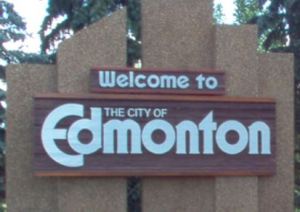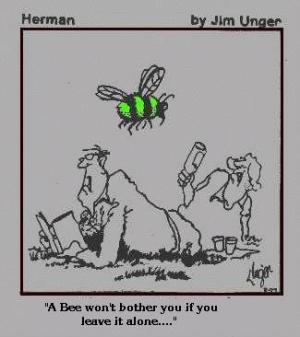 The city of Edmonton, Alberta, is telling its citizens that bees are good. People sometimes forget. Not long ago, Obama was trying to calm screaming kids on the White House lawn when one child spotted a bee and dozens panicked. That was D.C. Edmonton (though it has a million people) has rural routes. It’s the capital of the biggest honey regime in Canada. The chief apiary guy (Medhat Nasr) lives and works in Edmonton. Lots of Edmontonians have uncles and aunts and grandparents still out on the farm. The agricultue minister (Oneil Carlier) lives on the edge of the city. Yet, the city would like people to chill out about pollinators.
The city of Edmonton, Alberta, is telling its citizens that bees are good. People sometimes forget. Not long ago, Obama was trying to calm screaming kids on the White House lawn when one child spotted a bee and dozens panicked. That was D.C. Edmonton (though it has a million people) has rural routes. It’s the capital of the biggest honey regime in Canada. The chief apiary guy (Medhat Nasr) lives and works in Edmonton. Lots of Edmontonians have uncles and aunts and grandparents still out on the farm. The agricultue minister (Oneil Carlier) lives on the edge of the city. Yet, the city would like people to chill out about pollinators.
A story in the Edmonton Journal (City releases new videos to clear up buzz about bad bees) tells us that since urban beekeeping is legal and popular in the city, a series of 5 short videos are being produced and released to the public. The first, comparing bees to wasps, is just 33-seconds long, but may help people realize that bees aren’t the nasty, ugly, aggressive war-machines that wasps are. Bees are gentle and sweet. And will usually leave you alone if you don’t bother them. Here is the bee-promo, produced by contractors working for the City of Edmonton:
By the way, the film project hired Edmonton-based Amplomedia (for $5,000) to make the 5 pro-bee videos. The company specializes in getting messages across in a minute or less. A good idea since attention spans need to be be measured in milliseconds these days.
 Urban Beekeeping was legalized in March by Edmonton’s city council. As part of the education package, city dwellers are being reminded that bees are natural, bees are pollinators, and bees may displace meaner and less manageable stinging insects. That last point, made by Hani Quan, a planner with the Edmonton Food Council, is dubious and double-edged. Quan, according to the Edmonton Journal, said, “The more bees we have, the less wasps we have.” It is highly debatable that honeybees displace wasps, resulting in fewer of the meaner hymenoptera. The two groups occupy quite different ecological niches and eat entirely different groceries. Further, honeybees have been named as culprits in chasing out lesser bees – native bees such as various bumble bee species which are disappearing.
Urban Beekeeping was legalized in March by Edmonton’s city council. As part of the education package, city dwellers are being reminded that bees are natural, bees are pollinators, and bees may displace meaner and less manageable stinging insects. That last point, made by Hani Quan, a planner with the Edmonton Food Council, is dubious and double-edged. Quan, according to the Edmonton Journal, said, “The more bees we have, the less wasps we have.” It is highly debatable that honeybees displace wasps, resulting in fewer of the meaner hymenoptera. The two groups occupy quite different ecological niches and eat entirely different groceries. Further, honeybees have been named as culprits in chasing out lesser bees – native bees such as various bumble bee species which are disappearing.
Nevertheless, keeping honeybees assures pollination of a range of flowers in Edmonton. Beekeepers serve a role in maintaining the city’s diverse avocations. Beekeepers are usually among the most sensitive promoters of a clean, healthy environment. The activity is licensed and regulated in Edmonton and the new education program also helps urban beekeepers know their responsibilities. To help with that, the city has issued this Urban Beekeeping Guidelines flyer which beekeepers everywhere may find useful..

Nice to see that urban beekeeping is being supported by the city council.
LikeLike